70+ Subject and Predicate Examples
In English grammar, a sentence is divided into two main parts: the subject and the predicate. The subject is the person, place, thing, or idea that is doing or being something in the sentence. It usually appears before the predicate and tells us what or who the sentence is about. The predicate, on the other hand, tells us what the subject is doing or describes its state of being. It includes the verb and everything that follows. Understanding the roles of the subject and predicate helps us build clear and effective sentences.
What is a Subject?
What is a Predicate?
A predicate is the part of a sentence or clause that tells us what the subject does or is. It includes the verb and all other details that describe what is going on. For instance, in the sentence “The cat sleeps on the mat,” “sleeps on the mat” is the predicate, which tells us what the cat is doing. Essentially, the predicate provides information about the action that the subject is involved in or the state of being of the subject.
Types of Subject and Predicate
Types of Subject
- Simple Subject: This is the main word or word group that tells who or what the sentence is about. For example, in the sentence “The quick brown fox jumps over the lazy dog,” “fox” is the simple subject.
- Complete Subject: This includes the simple subject and any words related to it. Using the previous example, “The quick brown fox” is the complete subject.
- Compound Subject: When a sentence has two or more subjects that share the same verb, it is called a compound subject. For instance, in “The cat and the dog sleep,” both “cat” and “dog” are subjects doing the same action.
Types of Predicate
- Simple Predicate: This is the verb or verb phrase that tells something about the subject. In the sentence “The children play in the park,” “play” is the simple predicate.
- Complete Predicate: This includes the verb and all the words that relate to it, which give more information about the subject’s actions or state of being. From the same sentence, “play in the park” is the complete predicate.
- Compound Predicate: A compound predicate occurs when two or more verbs or verb phrases share the same subject. For example, in “She writes and edits every day,” “writes and edits” are both actions performed by the subject.
Examples of Subject and Predicate in Sentences
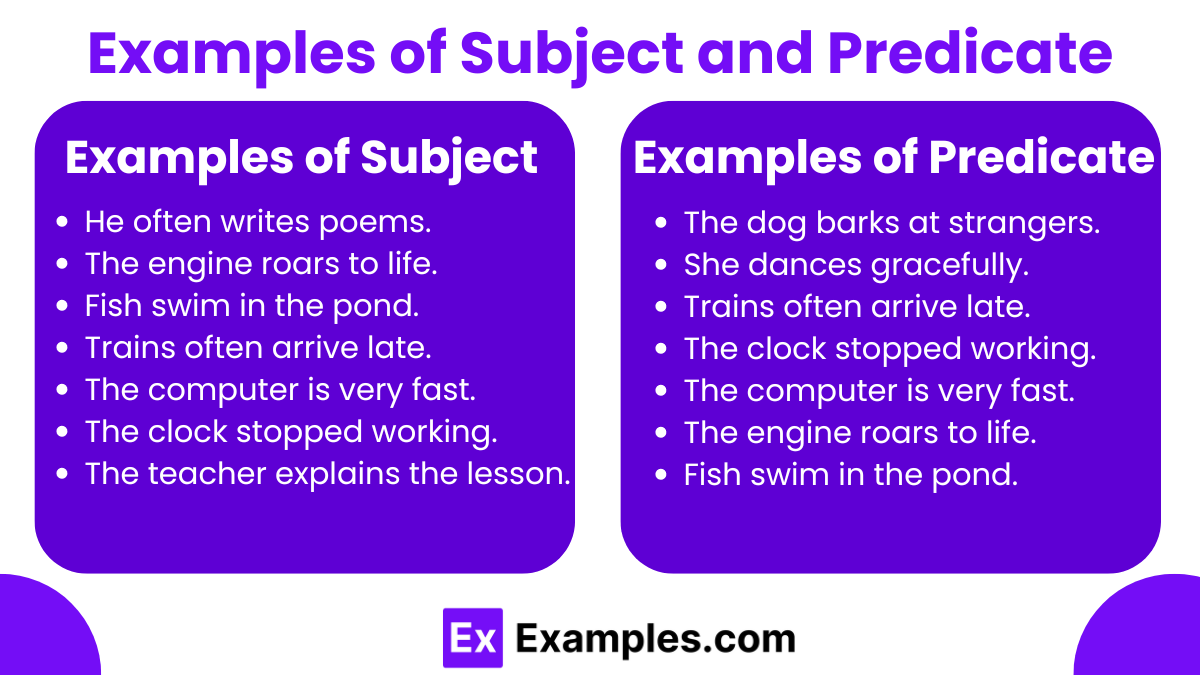
Examples of Subjects in Sentences
- Birds chirp loudly in the morning.
- The dog barks at strangers.
- She dances gracefully.
- Trains often arrive late.
- The teacher explains the lesson.
- Water freezes at zero degrees Celsius.
- The car broke down on the highway.
- Tom plays basketball on weekends.
- The clock stopped working.
- The computer is very fast.
- The old man across the street often sits on his porch.
- All the students in the classroom are attentive.
- The noisy neighbors finally moved out.
- The tall and handsome actor received an award.
- A glass of water sits on the table.
- John and Mary are planning a trip.
- The cat and the dog seem to get along well.
- My brother and I went hiking.
- The sun sets beautifully by the beach.
- He often writes poems.
- The leaves on the tree turn bright colors in autumn.
- The baker makes fresh bread daily.
- The gardener tends to the plants.
- The books on the shelf are dusty.
- The engine roars to life.
- Fish swim in the pond.
- The teacher and the students engage in a lively discussion.
- Computers have become essential in daily life.
- The painter captures stunning landscapes.
- The wind and rain swept through the town.
- The singer captivated the audience.
Examples of Predicates in Sentences
- Birds chirp loudly in the morning.
- The dog barks at strangers.
- She dances gracefully.
- Trains often arrive late.
- The teacher explains the lesson.
- Water freezes at zero degrees Celsius.
- The car broke down on the highway.
- Tom plays basketball on weekends.
- The clock stopped working.
- The computer is very fast.
- The old man across the street often sits on his porch.
- All the students in the classroom are attentive.
- The noisy neighbors finally moved out.
- The tall and handsome actor received an award.
- A glass of water sits on the table.
- John and Mary are planning a trip.
- The cat and the dog seem to get along well.
- My brother and I went hiking.
- The sun sets beautifully by the beach.
- He often writes poems.
- The leaves on the tree turn bright colors in autumn.
- The baker makes fresh bread daily.
- The gardener tends to the plants.
- The books on the shelf are dusty.
- The engine roars to life.
- Fish swim in the pond.
- The teacher and the students engage in a lively discussion.
- Computers have become essential in daily life.
- The painter captures stunning landscapes.
- The wind and rain swept through the town.
- The singer captivated the audience.
Examples of Subject and Predicate for Kids
- The cat purrs softly.
- Subject: The cat
- Predicate: purrs softly
- Birds fly high in the sky.
- Subject: Birds
- Predicate: fly high in the sky
- My teacher teaches us math.
- Subject: My teacher
- Predicate: teaches us math
- The flowers are blooming.
- Subject: The flowers
- Predicate: are blooming
- Dogs bark loudly.
- Subject: Dogs
- Predicate: bark loudly
- The sun sets in the evening.
- Subject: The sun
- Predicate: sets in the evening
- Our car goes very fast.
- Subject: Our car
- Predicate: goes very fast
- The stars twinkle at night.
- Subject: The stars
- Predicate: twinkle at night
- Elephants have big ears.
- Subject: Elephants
- Predicate: have big ears
- The book lies on the table.
- Subject: The book
- Predicate: lies on the table
1.Sample Subject and Predicate
3. General Subjects and Predicates
How to Use Subject and Predicate
Using subjects and predicates correctly is crucial for constructing clear sentences
Identify the Subject
Determine who or what the sentence is about. This is the subject.
Choose the Predicate
Decide what the subject is doing or what is happening to it. This part, which includes the verb and possibly other elements, is the predicate.
Ensure Agreement
Ensure the subject and predicate agree in number (singular or plural) for grammatical accuracy.
Expand the Predicate
For more detailed sentences, add descriptions, objects, or complements to the predicate.
Use Compound Elements
Incorporate compound subjects or predicates to convey more information or actions in one sentence.
Tips for Using Subject and Predicate
- Keep Subject and Predicate Close: Aim to keep your subject and predicate close together to avoid confusing sentence constructions. This helps maintain clarity and focus in your writing.
- Start with Simple Structures: When learning or teaching grammar, begin with simple subject-predicate structures before introducing more complex sentences with additional elements like modifiers or clauses.
- Vary Sentence Length and Structure: Mix short sentences with longer, more complex ones to make your writing more interesting. Use compound subjects or predicates to vary the structure and add depth.
- Check for Agreement: Always ensure that your subject and predicate agree in number and tense. This agreement is crucial for creating grammatically correct sentences.
- Use Active Voice: Whenever possible, use active voice as it makes sentences clearer and more direct by showing who is performing the action.
- Practice Identifying: Practice by identifying subjects and predicates in sentences you read. This will help you understand how they are used in different contexts.
- Experiment with Inversions: Experiment with sentence inversions, especially in questions or for emphasis. For example, instead of saying “The chef cooked the meal,” you might say, “Was the meal cooked by the chef?”
How Do You Explain Subject and Predicate to a Child?
Explain that the subject is who or what the sentence is about, and the predicate tells what the subject does.
How to Find Subject and Predicate in a Question Sentence?
Identify the main verb first, then find who or what is doing the action (subject) and what action they’re performing (predicate).
What Is the Easiest Way to Identify a Subject and Predicate?
Locate the verb first, then find who or what is doing the action (subject) and what else is happening (predicate).
How Do You Identify the Predicate of a Sentence?
The predicate is everything in the sentence that describes what the subject is doing, including the verb and its complements.
What Is the Rule for Subject Predicate?
A subject must always agree with its predicate in number and tense, ensuring grammatical consistency in a sentence.
How to Teach Subject and Predicate in a Fun Way?
Use games or interactive writing exercises that involve identifying and creating subjects and predicates.
Can a Predicate Come Before a Subject?
Yes, especially in questions and some types of sentences for emphasis, the predicate can precede the subject.
What Is the Subject Predicate Object?
The subject performs the action, the predicate is the action or state of the subject, and the object receives the action.
Does a Complete Sentence Need a Predicate?
Yes, a complete sentence requires a predicate to express a complete thought about the subject.
What Is Subject and Predicate With Example?
The subject is “dog” and the predicate is “barked loudly” in the sentence “The dog barked loudly.”
70+ Subject and Predicate Examples
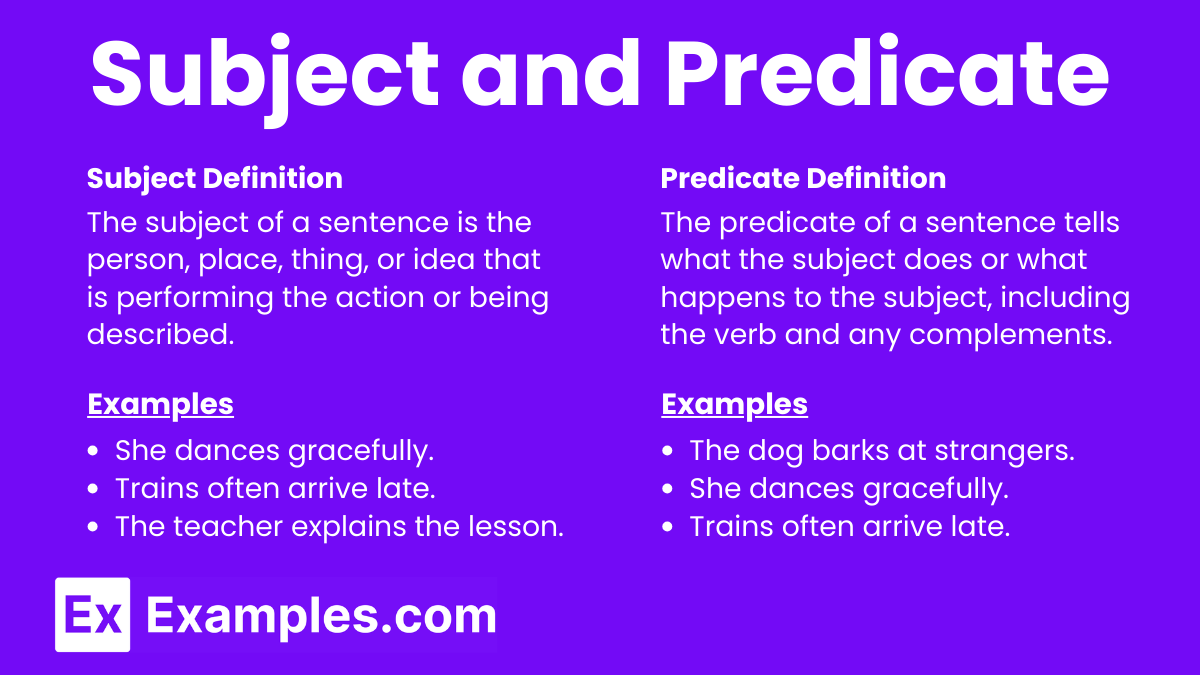
In English grammar, a sentence is divided into two main parts: the subject and the predicate. The subject is the person, place, thing, or idea that is doing or being something in the sentence. It usually appears before the predicate and tells us what or who the sentence is about. The predicate, on the other hand, tells us what the subject is doing or describes its state of being. It includes the verb and everything that follows. Understanding the roles of the subject and predicate helps us build clear and effective sentences.
What is a Subject?
A subject is the person, place, thing, or idea that performs the action in a sentence or about which something is stated. It typically appears before the verb and identifies who or what is doing the action or who or what is being described. For example, in the sentence “The teacher explains the lesson,” “the teacher” is the subject because the teacher is performing the action of explaining
What is a Predicate?
A predicate is the part of a sentence or clause that tells us what the subject does or is. It includes the verb and all other details that describe what is going on. For instance, in the sentence “The cat sleeps on the mat,” “sleeps on the mat” is the predicate, which tells us what the cat is doing. Essentially, the predicate provides information about the action that the subject is involved in or the state of being of the subject.
Types of Subject and Predicate
Types of Subject
Simple Subject: This is the main word or word group that tells who or what the sentence is about. For example, in the sentence “The quick brown fox jumps over the lazy dog,” “fox” is the simple subject.
Complete Subject: This includes the simple subject and any words related to it. Using the previous example, “The quick brown fox” is the complete subject.
Compound Subject: When a sentence has two or more subjects that share the same verb, it is called a compound subject. For instance, in “The cat and the dog sleep,” both “cat” and “dog” are subjects doing the same action.
Types of Predicate
Simple Predicate: This is the verb or verb phrase that tells something about the subject. In the sentence “The children play in the park,” “play” is the simple predicate.
Complete Predicate: This includes the verb and all the words that relate to it, which give more information about the subject’s actions or state of being. From the same sentence, “play in the park” is the complete predicate.
Compound Predicate: A compound predicate occurs when two or more verbs or verb phrases share the same subject. For example, in “She writes and edits every day,” “writes and edits” are both actions performed by the subject.
Examples of Subject and Predicate in Sentences
Examples of Subjects in Sentences
Birds chirp loudly in the morning.
The dog barks at strangers.
She dances gracefully.
Trains often arrive late.
The teacher explains the lesson.
Water freezes at zero degrees Celsius.
The car broke down on the highway.
Tom plays basketball on weekends.
The clock stopped working.
The computer is very fast.
The old man across the street often sits on his porch.
All the students in the classroom are attentive.
The noisy neighbors finally moved out.
The tall and handsome actor received an award.
A glass of water sits on the table.
John and Mary are planning a trip.
The cat and the dog seem to get along well.
My brother and I went hiking.
The sun sets beautifully by the beach.
He often writes poems.
The leaves on the tree turn bright colors in autumn.
The baker makes fresh bread daily.
The gardener tends to the plants.
The books on the shelf are dusty.
The engine roars to life.
Fish swim in the pond.
The teacher and the students engage in a lively discussion.
Computers have become essential in daily life.
The painter captures stunning landscapes.
The wind and rain swept through the town.
The singer captivated the audience.
Examples of Predicates in Sentences
Birds chirp loudly in the morning.
The dog barks at strangers.
She dances gracefully.
Trains often arrive late.
The teacher explains the lesson.
Water freezes at zero degrees Celsius.
The car broke down on the highway.
Tom plays basketball on weekends.
The clock stopped working.
The computer is very fast.
The old man across the street often sits on his porch.
All the students in the classroom are attentive.
The noisy neighbors finally moved out.
The tall and handsome actor received an award.
A glass of water sits on the table.
John and Mary are planning a trip.
The cat and the dog seem to get along well.
My brother and I went hiking.
The sun sets beautifully by the beach.
He often writes poems.
The leaves on the tree turn bright colors in autumn.
The baker makes fresh bread daily.
The gardener tends to the plants.
The books on the shelf are dusty.
The engine roars to life.
Fish swim in the pond.
The teacher and the students engage in a lively discussion.
Computers have become essential in daily life.
The painter captures stunning landscapes.
The wind and rain swept through the town.
The singer captivated the audience.
Examples of Subject and Predicate for Kids
The cat purrs softly.
Subject: The cat
Predicate: purrs softly
Birds fly high in the sky.
Subject: Birds
Predicate: fly high in the sky
My teacher teaches us math.
Subject: My teacher
Predicate: teaches us math
The flowers are blooming.
Subject: The flowers
Predicate: are blooming
Dogs bark loudly.
Subject: Dogs
Predicate: bark loudly
The sun sets in the evening.
Subject: The sun
Predicate: sets in the evening
Our car goes very fast.
Subject: Our car
Predicate: goes very fast
The stars twinkle at night.
Subject: The stars
Predicate: twinkle at night
Elephants have big ears.
Subject: Elephants
Predicate: have big ears
The book lies on the table.
Subject: The book
Predicate: lies on the table
1.Sample Subject and Predicate
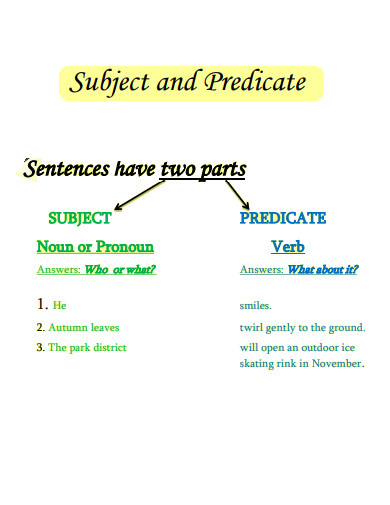
gvsd.org
Details
File Format
PDF
Size: 675 KB
Download[/ns_col
qmsmodeltown
2. Simple and Complete Subjects and Predicates
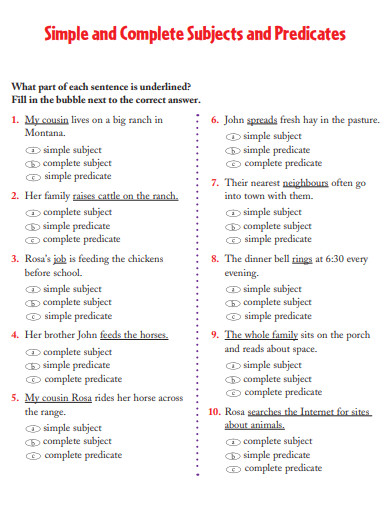
assets.ctfassets.net
Details
File Format
PDF
Size: 293 KB
3. General Subjects and Predicates
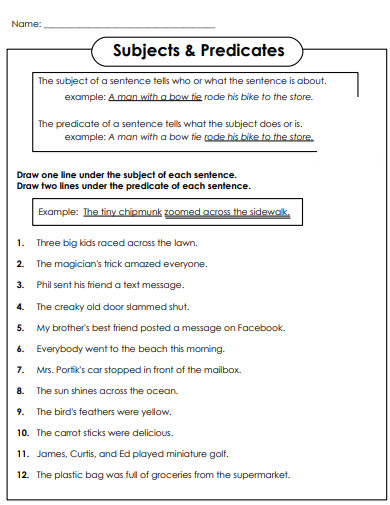
resources.finalsite.net
Details
File Format
PDF
Size: 79 KB
How to Use Subject and Predicate
Using subjects and predicates correctly is crucial for constructing clear sentences
Identify the Subject
Determine who or what the sentence is about. This is the subject.
Choose the Predicate
Decide what the subject is doing or what is happening to it. This part, which includes the verb and possibly other elements, is the predicate.
Ensure Agreement
Ensure the subject and predicate agree in number (singular or plural) for grammatical accuracy.
Expand the Predicate
For more detailed sentences, add descriptions, objects, or complements to the predicate.
Use Compound Elements
Incorporate compound subjects or predicates to convey more information or actions in one sentence.
Tips for Using Subject and Predicate
Keep Subject and Predicate Close: Aim to keep your subject and predicate close together to avoid confusing sentence constructions. This helps maintain clarity and focus in your writing.
Start with Simple Structures: When learning or teaching grammar, begin with simple subject-predicate structures before introducing more complex sentences with additional elements like modifiers or clauses.
Vary Sentence Length and Structure: Mix short sentences with longer, more complex ones to make your writing more interesting. Use compound subjects or predicates to vary the structure and add depth.
Check for Agreement: Always ensure that your subject and predicate agree in number and tense. This agreement is crucial for creating grammatically correct sentences.
Use Active Voice: Whenever possible, use active voice as it makes sentences clearer and more direct by showing who is performing the action.
Practice Identifying: Practice by identifying subjects and predicates in sentences you read. This will help you understand how they are used in different contexts.
Experiment with Inversions: Experiment with sentence inversions, especially in questions or for emphasis. For example, instead of saying “The chef cooked the meal,” you might say, “Was the meal cooked by the chef?”
How Do You Explain Subject and Predicate to a Child?
Explain that the subject is who or what the sentence is about, and the predicate tells what the subject does.
How to Find Subject and Predicate in a Question Sentence?
Identify the main verb first, then find who or what is doing the action (subject) and what action they’re performing (predicate).
What Is the Easiest Way to Identify a Subject and Predicate?
Locate the verb first, then find who or what is doing the action (subject) and what else is happening (predicate).
How Do You Identify the Predicate of a Sentence?
The predicate is everything in the sentence that describes what the subject is doing, including the verb and its complements.
What Is the Rule for Subject Predicate?
A subject must always agree with its predicate in number and tense, ensuring grammatical consistency in a sentence.
How to Teach Subject and Predicate in a Fun Way?
Use games or interactive writing exercises that involve identifying and creating subjects and predicates.
Can a Predicate Come Before a Subject?
Yes, especially in questions and some types of sentences for emphasis, the predicate can precede the subject.
What Is the Subject Predicate Object?
The subject performs the action, the predicate is the action or state of the subject, and the object receives the action.
Does a Complete Sentence Need a Predicate?
Yes, a complete sentence requires a predicate to express a complete thought about the subject.
What Is Subject and Predicate With Example?
The subject is “dog” and the predicate is “barked loudly” in the sentence “The dog barked loudly.”


